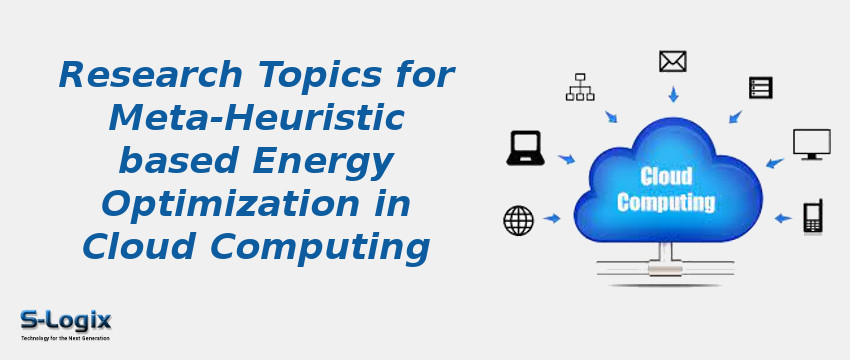A meta-heuristic optimization is a group of optimization algorithms that use general problem-solving techniques, such as simulation, randomization, and self-adaptation, to find good and best solutions to optimization problems.
Energy optimization in cloud computing refers to reducing energy consumption in data centers while ensuring the desired quality of service. Meta-heuristic algorithms can be applied to energy optimization in cloud computing to find the best solutions that balance energy efficiency and performance.
Some examples of meta-heuristic algorithms used for energy optimization in cloud computing include particle swarm optimization, ant colony optimization, and simulated annealing. These algorithms can optimize the resource allocation and scheduling of virtual machines in a cloud data center to reduce energy consumption while meeting performance requirements.
• Flexibility: Meta-heuristics can be applied to a wide range of energy optimization problems in cloud computing, making them a flexible solution for different energy-saving challenges.
• Global Optimization: Unlike traditional optimization methods, meta-heuristics can find globally optimal solutions for the entire problem space.
• Speed: Meta-heuristics algorithms can converge quickly to a good solution, making them suitable for real-time energy optimization in cloud computing environments.
• Robustness: Meta-heuristics can provide robust solutions even in uncertainty, making them suitable for energy optimization problems in cloud computing where the demand and resource utilization patterns may be variable.
• Scalability: Meta-heuristics can be easily scaled to accommodate large-scale energy optimization problems in cloud computing environments.
• Computational Overhead: Meta-heuristic algorithms can be computationally intensive, impacting the performance and responsiveness of cloud computing systems.
• Sensitivity to Hyperparameters: The performance of meta-heuristic algorithms can be sensitive to the choice of hyperparameters, such as the size of the population, the mutation rate, and the cooling schedule.
• Difficulty in Debugging: Debugging and understanding the behavior of meta-heuristic algorithms can be challenging, making it difficult to identify and resolve issues with the optimization process.
• Time Complexity: The time complexity of meta-heuristics can be high, making them unsuitable for real-time energy optimization in large-scale cloud computing environments.
• Local Optima: Meta-heuristics can get stuck in local optima, which are optimal only for a limited region of the problem space leading to suboptimal solutions for energy optimization problems in cloud computing.
• Dynamic Environment: Cloud computing environments are highly dynamic, with rapidly changing resource utilization patterns and workloads. Applying meta-heuristic algorithms effectively for energy optimization in cloud computing is difficult.
• Scalability: Scalability is a major challenge in energy optimization in cloud computing, as the number of resources and the scale of data centers can be massive. Meta-heuristics must be able to handle such scale data efficiently.
• Real-Time Optimization: Real-time energy optimization is necessary for cloud computing environments, as energy consumption patterns can change rapidly. Meta-heuristics must be able to provide real-time solutions for energy optimization in cloud computing.
• Quality of Service (QoS) Constraints: Energy optimization in cloud computing must ensure the desired quality of service (QoS) for applications and users. Balancing energy efficiency and performance while meeting QoS constraints is a major challenge in cloud computing meta-heuristic-based energy optimization.
• Energy-Aware Workload Placement: Meta-heuristics place workloads in cloud computing environments in a way that balances energy efficiency and performance.
• Resource Allocation and Scheduling: Meta-heuristics can allocate and schedule virtual machines in a cloud data center to reduce energy consumption while meeting performance requirements.
• Power Management: Meta-heuristics for power management in cloud computing, including optimizing the utilization of power-saving technologies such as dynamic voltage and frequency scaling.
• Load Balancing: Load balancing is a critical aspect of energy optimization in cloud computing. Meta-heuristics balance the workload across numerous resources to reduce energy consumption while ensuring high performance.
• Data Center Consolidation: Data center consolidation is a key energy optimization strategy in cloud computing to consolidate multiple data centers into a smaller number of more energy-efficient facilities.
• Hybrid Approaches: Combining meta-heuristics with other optimization techniques such as linear programming, game theory, and machine learning to create hybrid approaches that improve the efficiency and effectiveness of energy optimization in cloud computing.
• Edge Computing: Applying meta-heuristics to optimize energy consumption in edge computing environments, where resources are distributed at the edge of the network.
• Integration with IoT: Integrating meta-heuristics with IoT (Internet of Things) devices and systems to optimize energy consumption in cloud computing environments that involve large numbers of connected devices.
• Autonomous Systems: Developing meta-heuristics integrated into autonomous systems for energy optimization in cloud computing, where decisions are made without human intervention.
• Big Data Analytics: Incorporating big data analytics into meta-heuristic-based energy optimization algorithms to improve the accuracy and effectiveness of energy optimization in cloud computing environments.
• Real-Time Energy Optimization: Developing meta-heuristics that can optimize real-time energy in cloud computing environments, where energy consumption patterns can change rapidly.
• Edge Computing Energy Optimization: Applying meta-heuristics to optimize energy consumption in edge computing environments, where resources are distributed at the edge of the network.
• IoT-based Energy Optimization: Integrating meta-heuristics with IoT (Internet of Things) devices and systems to optimize energy consumption in cloud computing environments that involve large numbers of connected devices.
• Cloud Resource Management: Developing meta-heuristics for cloud resource management to optimize energy consumption while ensuring high performance and availability.
• Green Cloud Computing: Developing meta-heuristics to support the development of green cloud computing, including reducing energy consumption in data centers and optimizing renewable energy sources.
• Autonomous Energy Optimization: Developing meta-heuristics that can be integrated into autonomous systems for energy optimization in cloud computing, where decisions are made without human intervention.
